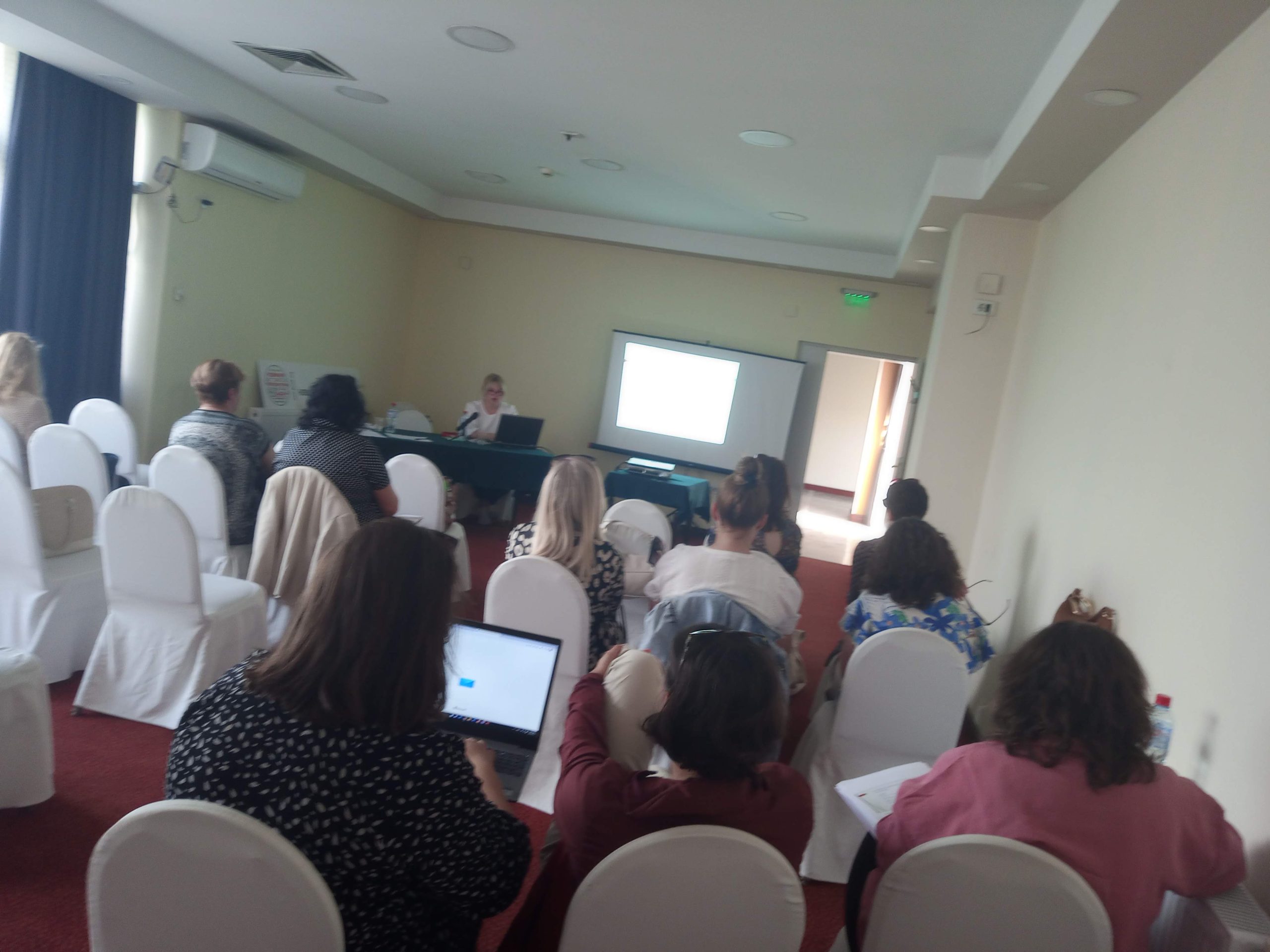Child trafficking – institutional mechanisms, procedures, protection, prevention, Measures for resolving conflicts when communicating with parents, Measures for building relationships between teachers and parents, “New authority” approach in schools, Bullying and prevention: Strengthening children ( of their individual and strengthening of the school community), Psychological first aid for children (individuals and groups), were the topics of discussion with representatives from schools, social work centers at the second two-day training for building the capacities of institutional representatives to effectively share information about children who are absent from school, which took place on June 5 and 6 in Skopje.
The purpose of the series of trainings within the framework of the “Pilot project for the early warning system for missing children” implemented by the CSO “Journalists for Human Rights”, is to promote the capacity building of institutional representatives to effectively share information about children who are absent from school, and the representatives of the institutions and authorities also at the second training, together with 4 experts from Austria and North Macedonia, strengthened the capacities for facilitated inter-institutional exchange of information. The ultimate goal is that the facilitated ways of inter-institutional communication help the functioning of the Early Warning System for Missing Children website, contributing to reducing the risk of children disappearing.
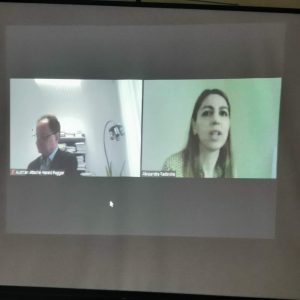
In an online address Mag. Harald Fugger, attaché of the Federal Ministry of Social Affairs, Health, Care and Consumer Protection of the Republic of Austria congratulated the project and praised the efforts of the participants to improve child protection mechanisms through cooperation.
– The fight against human trafficking is a multidisciplinary endeavor in which preventive, repressive, supportive and coordinating tasks must work together. Poverty is the main reason for child trafficking in many countries, as well as in North Macedonia, so it is important for the country to establish child guarantees, and I heard that it is a plan to establish it in the future in your country as well – said Mag. Harald Fugger.
That said, child protection must be a top priority for all countries that have ratified the UN Convention on the Rights of the Child. In order to effectively enforce this, a separate child protection law is needed that covers all relevant areas such as: an independent monitoring body for the implementation of children’s rights, clearly clarifying the obligations and tasks of all stakeholders working with children and young people for child protection, development of child protection strategies and concepts, sufficient funding of measures and services against child exploitation and trafficking, measures against violence and counseling services and support for victims, awareness raising, education and equal opportunities, especially in relation to disadvantaged and vulnerable groups.
Aleksandra Radevska, project coordinator from “Journalists for Human Rights”, pointing out that the purpose of the training is to facilitate the principle of information exchange about children who are absent from school for more than three days and are thus at risk of disappearance, presented main topics discussed at the first two-day workshop: Right to free access to public information, Protection of personal data and sharing by institutions caring for children, Introduction to trauma management and self-care related to missing children and Relationship building measures and trust and conversation management and some of the conclusions: Creating a network for easier cooperation of institutions, non-governmental organizations and parents and children, improving services for children, with reforms in integrated crisis management with social services, the way of sharing public information, the protection of data to build on efforts for more structured information on children who are absent from school, support systems for school staff and more self-care training, the continued work of the register of phantom persons, to develop an inter-institutional system for the exchange of information on children who truant from school to strengthen the early warning system with another tool to minimize the risk of children going missing.
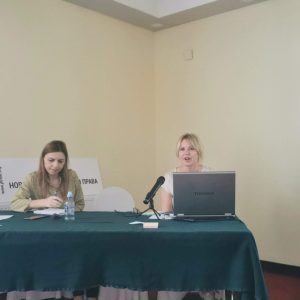 Nermina Faković, head of the department for preventive health care and coordinator for equal opportunities for women and men in the Ministry of Health of North Macedonia, gave an introduction to human trafficking and the Macedonian institutional framework, identification procedure and prevention. Speaking about the preventive measures, she mentioned that as part of the early warning system for missing children, the website “Najdime.org.mk” was opened – by the NGO Journalists for Human Rights. She presented the structures and methodology for the protection of children at risk and specific risks from street children being victims of human trafficking.
Nermina Faković, head of the department for preventive health care and coordinator for equal opportunities for women and men in the Ministry of Health of North Macedonia, gave an introduction to human trafficking and the Macedonian institutional framework, identification procedure and prevention. Speaking about the preventive measures, she mentioned that as part of the early warning system for missing children, the website “Najdime.org.mk” was opened – by the NGO Journalists for Human Rights. She presented the structures and methodology for the protection of children at risk and specific risks from street children being victims of human trafficking.
Natasha Amdiјu, an independent expert presented the measures for resolving conflicts in dealing with parents. There was also a discussion about cases of a child who they believe was a subject of human trafficking and/or is outside the educational process, and the cause, i.e. the root of the problem, those responsible, as well as the procedures were considered – communication with institutions, communication with parents… The participants worked out the principles of conflict resolution through a practical role-playing exercise, and discussed legal steps that should 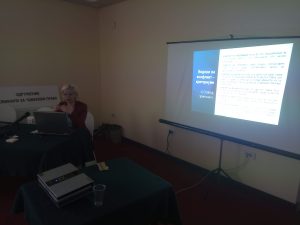 and could be taken to resolve the situation in the best interest of the child. They also considered the obligations and legal responsibilities that each of the actors in this case have and that may arise as an issue of conflict.
and could be taken to resolve the situation in the best interest of the child. They also considered the obligations and legal responsibilities that each of the actors in this case have and that may arise as an issue of conflict.
Elizabeth Hartl from the Child Protection Center – Reute spoke about measures to build relationships between teachers and parents, and mentioned Roma school mediators as a program that helps ensure school attendance; preventing and dealing with the problem of dropping out of school; encouraging academic success; favoring positive relations between Roma and non-Roma children. She also spoke about bullying and prevention, strengthening children (on an individual level, but also strengthening the class community). She presented a series of exercises and intervention approaches when it comes to bullying at school, and the participants shared their experiences and previous practices that are regular in the educational process in order to prevent bullying.
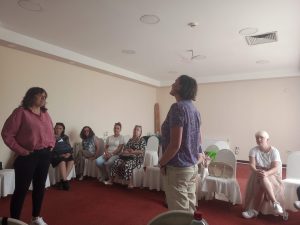 Monika Steiner Tolic from the Child Protection Center – Tyrol, presented the “New Authority” approach in schools, pointing out that now children are the authority unlike before when it was teachers, parents, doctors… The participants had the opportunity to work on practical exercises for avoiding the power struggle, and psychological first aid for children (individuals and groups) was presented. The steps of crisis management and an emergency plan were analyzed, which is a guide for ensuring protection of vulnerable persons, reduction of subsequent damages. Crisis management in the school implies a quick, structured and coordinated approach, which helps in case of sudden events (accidents, deaths, …)
Monika Steiner Tolic from the Child Protection Center – Tyrol, presented the “New Authority” approach in schools, pointing out that now children are the authority unlike before when it was teachers, parents, doctors… The participants had the opportunity to work on practical exercises for avoiding the power struggle, and psychological first aid for children (individuals and groups) was presented. The steps of crisis management and an emergency plan were analyzed, which is a guide for ensuring protection of vulnerable persons, reduction of subsequent damages. Crisis management in the school implies a quick, structured and coordinated approach, which helps in case of sudden events (accidents, deaths, …)
From the information shared at the second two-day capacity building training for institutional representatives on effective sharing of information about children who are absent from school, what was concluded from international as well as local experience is that cooperation with all relevant stakeholders, institutions and organizations is vital and when it comes to absence from school, with the aim of improving the protection of children from disappearance or trafficking, but also with the aim of strengthening and economic security of children from vulnerable groups and their safer and more prosperous future. Awareness-raising, education and equal opportunities, especially for disadvantaged and vulnerable groups, are crucial at the early stage of education, but also at family and community level. The importance of proactive and continuous close cooperation and coordination of schools with the police, social services, trainings, education of parents and children, but also support systems for school staff and social workers, as well as the existence of a social worker in schools, was 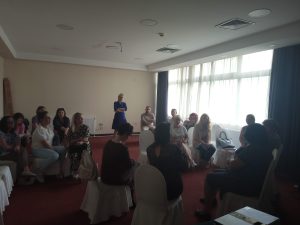 emphasized. Inter-institutional communication and exchange of information is of crucial importance, especially since schools and social centers are understaffed, so this can help prevent or detect risks and introduce proactive measures to prevent a case of child trafficking from occurring. , early marriages, dropping out of school… The issue of undocumented persons and undocumented children was discussed and the hope was expressed that the process started with the parliamentary procedure for amendments to the Law on the Birth Register will enable the resolution of all known cases of statelessness, but also for every child born in the country to receive a birth certificate, regardless of whether the parents are undocumented or stateless.
emphasized. Inter-institutional communication and exchange of information is of crucial importance, especially since schools and social centers are understaffed, so this can help prevent or detect risks and introduce proactive measures to prevent a case of child trafficking from occurring. , early marriages, dropping out of school… The issue of undocumented persons and undocumented children was discussed and the hope was expressed that the process started with the parliamentary procedure for amendments to the Law on the Birth Register will enable the resolution of all known cases of statelessness, but also for every child born in the country to receive a birth certificate, regardless of whether the parents are undocumented or stateless.
The participants agreed to continue cooperation in the future in order to further contribute to the strengthening of the early warning system for missing children and the prevention and protection of children from the risk of human trafficking and disappearance.
“Journalists for Human Rights” in cooperation and under the project management of “ECPAT Austria”, implements the project in North Macedonia, including various stakeholders (public and private sector, civil society organizations, media, business sector) in the period from July 1, 2021 – December 31, 2023, with financial support from the Federal Ministry of Social Affairs, Health, Care and Consumer Protection.




 Македонски
Македонски